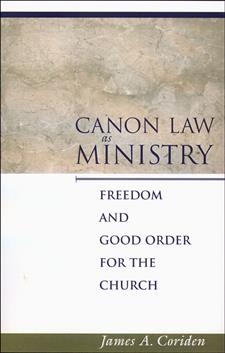Canon Law as Ministry: Freedom and Good Order for the Church
By James Coriden
ISBN: 0809139782
£9.00 (St Philip’s Books)
By James Coriden
ISBN: 0809139782
£9.00 (St Philip’s Books)
As something on a Canon Law enthusiast I decided to spend my
birthday gift voucher exploring the western tradition of Catholic Canon Law and
was advised by a friend of similar interests to pick up some works by James
Coriden, a much respected Catholic Canonist. This led me to pick up the text
and start some exploration into this section of canon studies. A quick note on
this text, it is designed for the Canonist and not for a general introduction
to Canon Law in the Catholic Church so in my final paragraph, I will not be
recommending it for general reading. This is not a criticism of the book, just
a quick point before people who read this review start saying how they will add
it to their reading list.
From the start, Canon Law as ministry sets outs its aim
clearly. It is written with the purpose of saving the reputation of the
canonist from the wave of infamy which has engulfed canonology since Vatican
II. Coriden makes it clear that he feels that Canonists have been given a bad
reputation since the Catholic Church’s shift in emphasis at the Council from
the more tradition concept of Christian morality to the somewhat vague
conscience based system. Coriden states his concern that this has led to Canon
law becoming seen as an outdated and archaic practice and the text gives a
clear outline to the canonist as to how the concept of Canonology is still a
vital part in the Catholic Church today.
Now I am by no means an expert on Catholic Canonology though
with my academic research area being Orthodox Canonology I felt the text was a
good place to start to gain an understanding of Western Canonology since it is
designed to put the area into a modern context and it does this very well with
clear links made to both local issues in the parish and wider issues which
encompass the entire Catholic Church. The book starts by giving an analysis of
the current debate over Canon Law. This section was fascinating since it sets
out the different schools of Canon Law clearly and explains their development
well. This struck a chord with me as in the Orthodox community there are also
various different schools of canonology and it was interesting to see how many
of the Catholic approaches tend to fit well with some of the Orthodox ones and
how the Codification of Canon Law in the west has led to the development of a
wider variety of schools of Canon Law.
Following this, Coriden gives a historical and theological
overview of Canon Law. This section was one which I found quite disappointing
since it only covered the Canons from the Biblical perspective of law and their
codification, almost deliberately missing out the centuries of the use of the
Canons as guidance as opposed to a codified legal system. This is of no
consequence to the message of the text though, as it moves on to analyse the
role of Canon Law in the Catholic Church today, especially its role as granting
assistance in dealing with issues of freedom and also in promoting good order
in the Church. The book finishes with an explanation of the place of the
Canonist as a minister and Canon Law itself as the ministry of the Canonist,
again setting out the emphasis of the remaining vital place of Canon Law in the
Church.
The main strength of the book comes from Coriden’s writing.
You can see that he is a firm believer in the vital place of Canon Law in the
Church and this comes across in his style. From Coriden’s use of his local
parish Church to demonstrate the practical benefits of correct canonology for
the people to his grand scale dream of the vindication of the canonist, the
text is most certainly a heartfelt pledge for understanding. In the same way he
refers to the documents of Vatican II constantly to evidence his message of the
relevance of canonology.
On the other hand, Coriden’s conciliatory approach to the
topic seems to undermine the message. In this the text Coriden seems to
willingly accept the watering down of Canonology at times and spends much time
emphasising the conscience as a supreme moral guide. Though I appreciate this
point as sensible, especially in the modern Catholic Church, it seems to
backstep when the point of the book is to demonstrate that the Code of Canon Law
can still be applied in a meaningful way when the claim is followed by the clause
of it being ultimately up to the individual.
Overall, I found the text to be an interesting introduction
to the issues surrounding Canon Law in the Catholic Church, especially when
many of these issues are not found amongst the uncodified concept of canonology
in the East. Coriden raises many issues in the text which remind us of the
importance of the Canons as a form of ‘measure’ of the faith and as guidance and
is able to give some beautifully well thought out defences of the art of
Canonology in an age of relativity and moral personalism.
I would recommend the book to students of Canon Law, especially those
living in the West or looking into the struggles between Canonology and modernity. As previously mentioned I do not feel that it would
be an appropriate text as an introduction to the canons or for someone curious
on the matter without proper understanding of the subject. This is not a criticism of the text, since it does not set out
to introduce to the topic, however Coriden’s aim is to speak to the Canonists
of this generation and therefore as a text it is certainly to be left to the
Canonist as intended.


No comments:
Post a Comment